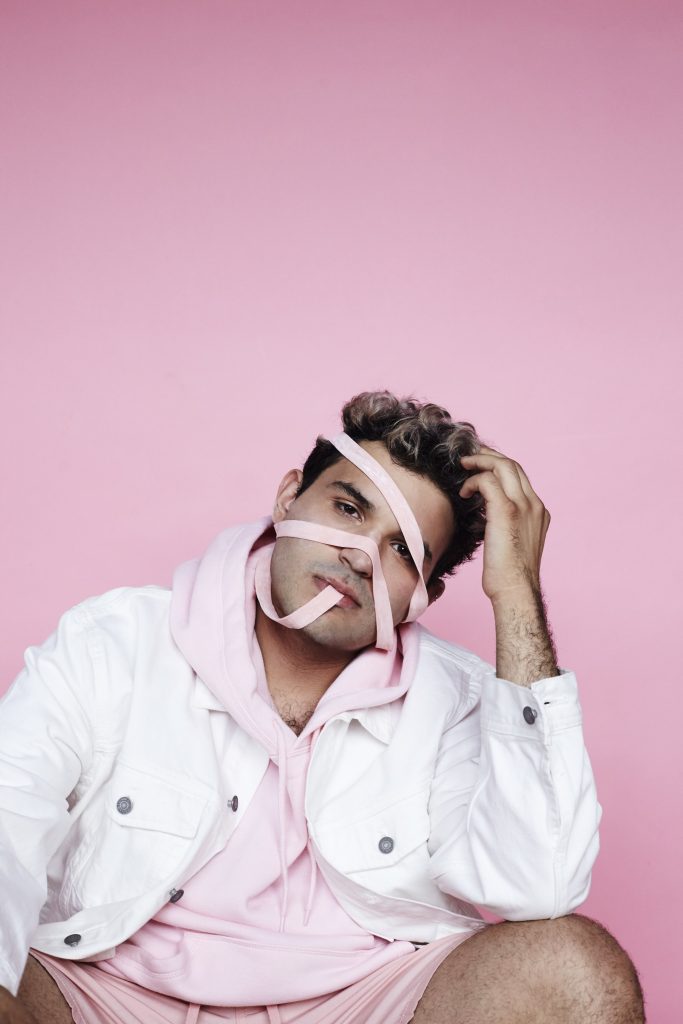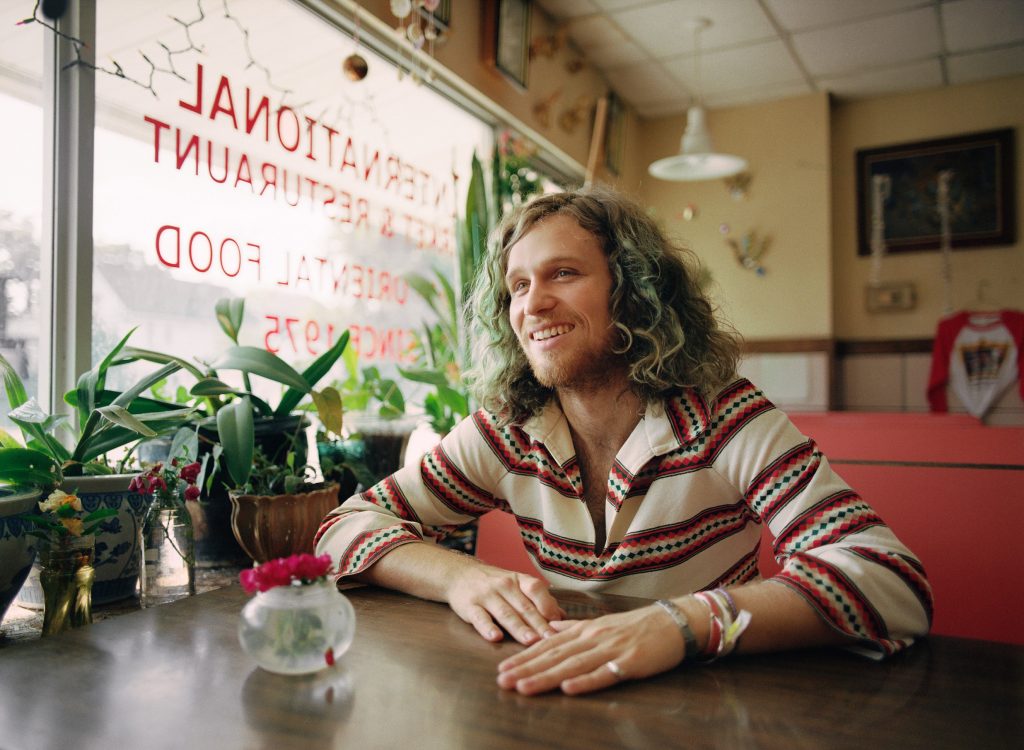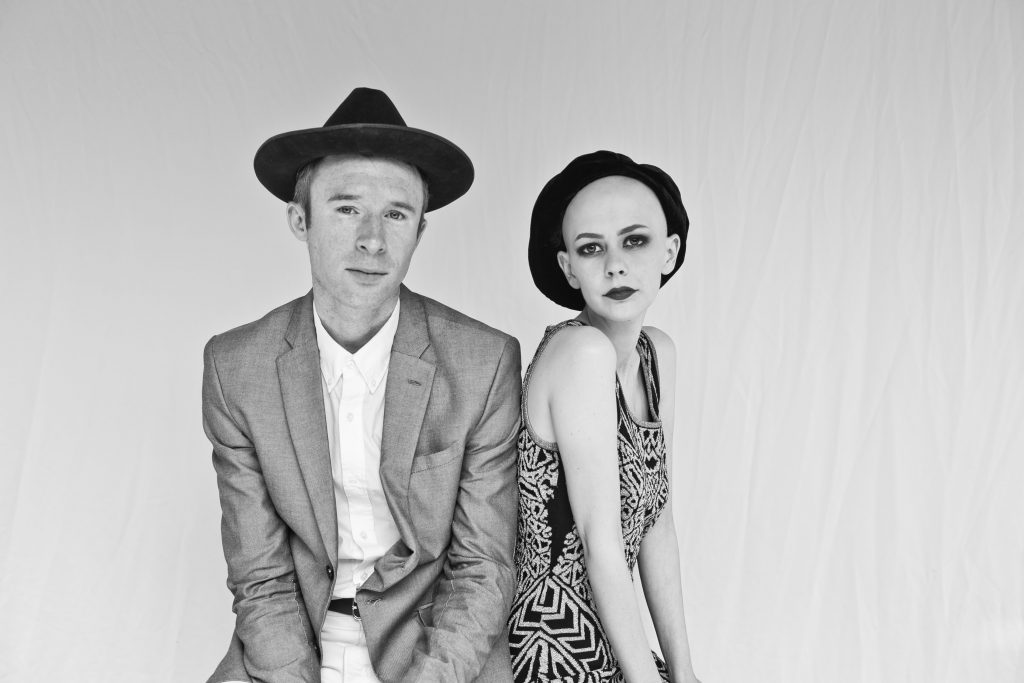
In 2014 Those Darlins appeared on the cover of NATIVE’s two-year anniversary issue. It was following the release of their new (and arguably best) album, Blur the Line, a record that saw Jessi Zazu, Nikki Kvarnes, and Linwood Regensburg taking a somber, sophisticated approach to their trademark brand of jokey noise-country.
While there were still traces of the band that had once swilled beer at Murfreesboro house shows (an 8th Avenue billboard bearing Blur the Line’s cover, which featured Those Darlins spooning naked, caused mild Internet outrage), this was a new direction for the Darlins. The humor of past tracks like “DUI or Die” or “Be Your Bro” gave way to a newfound sense of urgency and uncertainty. “There’s a tumor growing on my body,” Zazu sang on the album’s thumping closer, “Ain’t Afraid.” “And I don’t know what lays in store.”
The lines were prophetic.
In 2015 Those Darlins announced an “indefinite hiatus,” and a week after returning home from their farewell tour, Zazu was diagnosed with stage two cervical cancer. By November 2016, she learned that the cancer had metastasized and spread to her lymphatic system.
To quote her 2016 statement on her illness: “This is typically what they would call a ‘no cure scenario.’”
But Zazu is not typical. In the time since her diagnosis, friends, family, and fans have donated more than $50,000 to help with her treatment, and Zazu has vowed to keep making music and art—to remain unafraid. Her latest effort is UNDEFEATED, an upcoming art exhibit at Julia Martin Gallery that will feature pieces inspired by Zazu’s diagnosis and treatment. Zazu’s mother, Kathy Wariner, will be showing alongside her, and all proceeds will go toward covering the family’s ever-increasing medical bills.
In honor of the show, we had Zazu’s friend, former bandmate, and current collaborator Linwood Regensburg interview her about UNDEFEATED, life post-diagnosis, and the healing power of creativity. Their interview has been condensed and edited for clarity.
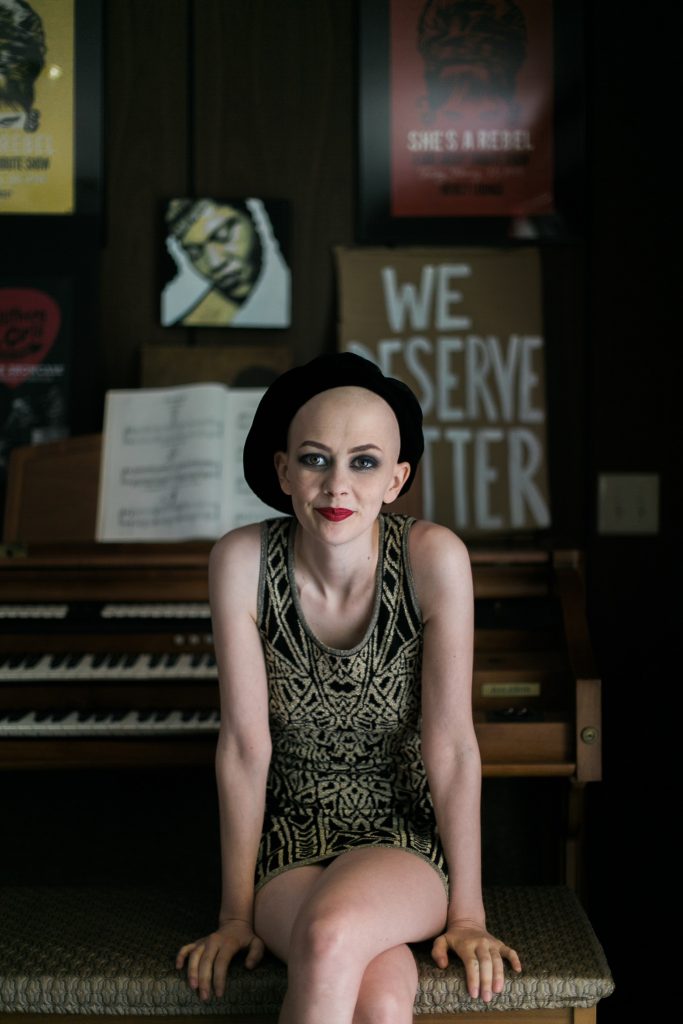
Regensburg: Well, let’s get started. Do you remember that time we were in the Beatles? That was pretty cool.
Zazu: [laughs] That’s great.
Regensburg: So stupid. Okay, I’m just trying to break the ice here between us. You’ve got a big show coming up. It’s interesting because this show features not only the work that you’ve done but also some paintings by your mom.
Zazu: Yeah, I’m really excited. My mom and I have never done a show together. She’s probably like my greatest artistic influence. You know, it’s really cool to be able to do this together.
Regensburg: When she’s around you guys are always painting and sketching and stuff together, which I’m sure you’ve done off and on for pretty much the whole twenty-seven years of your life.
Zazu: Yeah, I mean, she taught me how to draw. My dad’s an artist, too, and I learned a lot from him, but my mom was really adamant about specifically teaching me to do art. Throughout our life, that’s what we’ve done, and she’s always been creating. You know, we go through our phases where we’re not as productive as others, but yeah, I guess ever since we found out I had cancer, we both were kind of just like, “What are we going to do?” And the only thing we knew to do was, “Well, I guess we’ll just do some art.” I don’t know, that’s what we do.
Regensburg: Yeah, painting and making art has always been a big facet of your life. I wanted to say, maybe you should explain, too, what the story behind the paintings was in the first place?
Zazu: Back in the summer, when I first found out I had cancer, I had like six weeks of daily radiation. But at the end, I had these five sessions called brachytherapy . . . There’s a room in which I would get the brachytherapy radiation. It’s a small, lead-lined room, with a little machine in it that has a bunch of buttons and lights on it, and I would go in there and get it. While I was doing all this daily radiation and everything before I started brachytherapy, I was always taking photos and drawing and always brought my sketchbook with me, because I was wanting to capture as much as I could. I wanted to make a show out of my experience—at least that was sort of like my rough idea of a plan. I wanted to make something out of it, you know?
My doctor—named Dr. Peacock, who is awesome—noticed that I was doing this, and she asked me if I would be interested in making some artwork for the brachytherapy room, because it needed an update. I was just immediately, totally in, because I felt a very personal connection to completing or to updating that room in a way, because I had drawn everything in that room. I knew what was in there, I knew it needed an update, and I also knew just how I felt when I was in there.
Basically I was thinking, Wouldn’t it have been great if I had something to distract me from that a little bit? Something to kind of exercise my brain and maybe, I don’t know, make me think a little. That’s where I was coming from. That’s why I was so excited to be a part of that. It’s like it would be different if you asked an artist who hadn’t done it, but it’s like I knew exactly. I just did it, I knew exactly what it would be like for that person. The message was kind of what I was imagining I would’ve needed at that moment.
Regensburg: It’s almost that the paintings are sort of like trophies, in a way.
Zazu: Yeah.
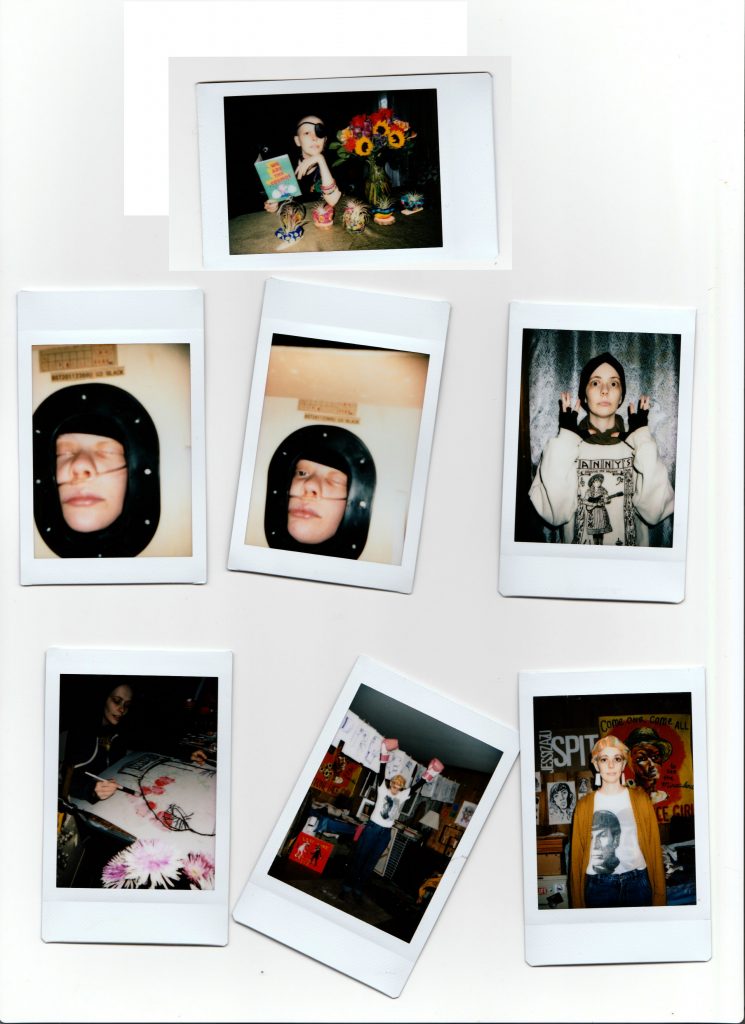
"I was freaking out on the inside, but I was just refusing to let it control me"
Regensburg: You’re getting treatment at Vanderbilt, and I don’t know how many days you’ve been there over the last year, but I would say you’ve been there sixty percent of the time? You’re always going back and forth. Have you become close with any people there?
Zazu: Yes. There are so many people that I’ve become close with, and it’s funny because some people I don’t even know their name, but I see them almost every week, you know?
Regensburg: Sure. When you’re doing chemo, you just have to sit there for about six hours. I imagine you’d develop something with the people administering it.
Zazu: There’s definitely some nurses in the injection clinic that I’ve really had a strong bond with. One in particular is named Kris and she—I’m borderline starting to feel like I’m going to cry, even just like thinking of her, because she’s been such an encouraging person to me through this whole thing. I think she was there on my first day. I remember she told my mom, “I can already tell she’s going to do well with this, because most people are usually freaking out at this point.” I was freaking out on the inside, but I was just refusing to let it control me that day, you know? I was just like, “Nope, I’m not going to go there.” I was really scared though.
I remember one day in particular—my mom wasn’t there with me, I think maybe my brother was there with me—and I was just crying. I couldn’t stop crying . . . It turned out what I really ended up needing was a blood infusion because I was low on red blood cells. I just felt terrible, and they couldn’t really figure out why at first. My body felt so, so bad. I remember Kris just came in and gave me the biggest hug and was like, “You can do this.” My mom wasn’t there—she was out of town—and Kris was in her place. She stepped in and had that motherly feeling to me, and I was so grateful, and literally, that got me through, you know? I needed that so badly at that moment.
Regensburg: Have you had any fellow cancer fighters or survivors reach out to you via Facebook or whatever, just to connect?
Zazu: Yeah, and I’ve had a lot of awesome, really great, powerful success stories. Even when we were at the Women’s March, this guy stopped me and let me know that he was a cancer survivor. He had been following my story, and he was really inspired by it. He believed in me and just wanted me to know that he was thinking of me and that it was possible to beat it and everything.
I really, really appreciated all of those people reaching out to me. It meant a whole lot to me. Because I just felt like, “Okay, this isn’t just me.” Like, there’s a lot of people who have done this, people who said, “I did it, I’m in remission and I’m living my life.” That was really important to me. It made me go, “Okay, I’m not going to just totally say, ‘Well, this is it and I have no chance or whatever.’”
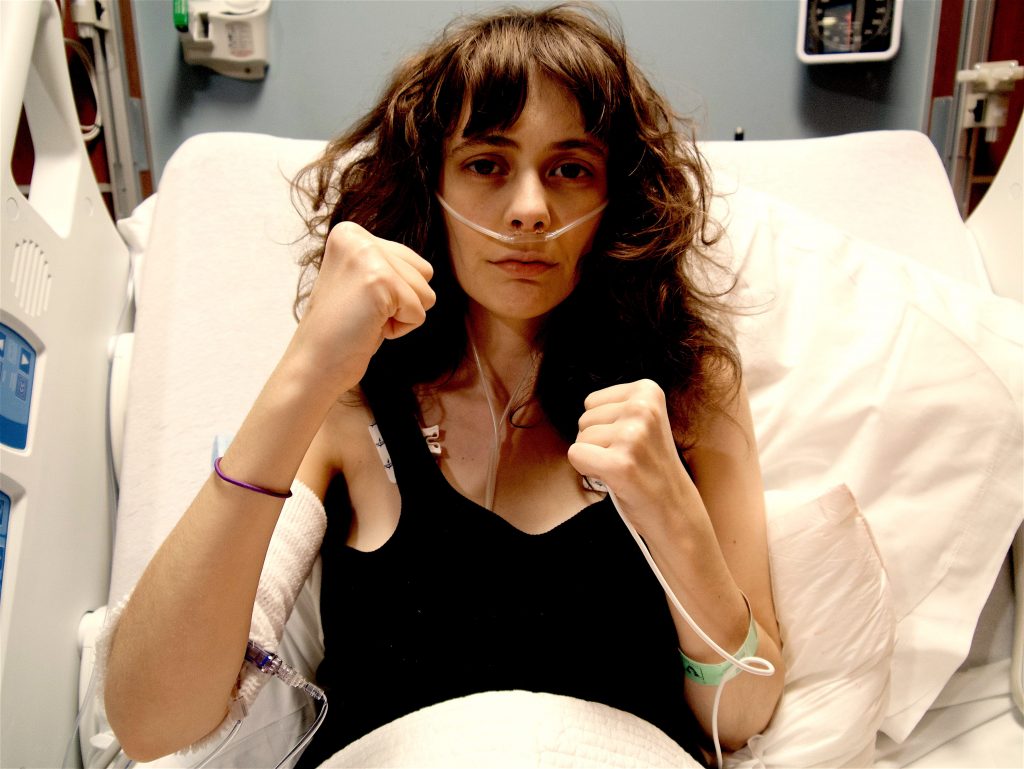
Regensburg: Do you have any advice for people that may be in a similar situation? Or maybe someone with a family member who is sick and they want to get involved, but maybe they’re dragging their feet on what to do?
Zazu: Don’t think of it so much as like there’s this big elephant in the room. Just think of them as who they are. Have the same relationship with them as you might have once had, or if you’re not that close, maybe you could get a little closer. If you were already close to them, and you’ve known them since your high school days or something, just treat them like you would if you saw them regularly, you know? That’s my main piece of advice.
Regensburg: You don’t have to come in and save somebody’s life. You know, maybe bring some flowers over and that’s enough to maybe tip the scales for a second.
Zazu: Right . . . Because it’s not like you just say it once and then you just have that feeling forever, you know? Setbacks happen every single day. You know this—you’ve been a big cheerleader for me. Like, you know that I get into those modes where I’m just like, “I can’t do this.” All I need is someone to just be like, you can and remind me of that. Even just that little bit is helpful, I would say.
Regensburg: Let’s change gears for a second here. I hear you’ve been working on some new stuff, on some new songs and whatnot. I’ve been a part of it too—that’s how I heard about it [laughs]. Do you know what the record is going to be called?
Zazu: We don’t know what we’re doing, we’re just doing it. Just trying to make some good grooves. Maybe I should ask you, what are we doing? What’s going on with the new album?
Regensburg: I recorded some yesterday, actually. Yeah, I did some more stuff. We’re kind of close to being done in some capacity, depending on how much more we do. It’s weird, people ask me what’s going on with it, and to me, I don’t know where the end of it is, necessarily.
Zazu: Yeah, me neither.
Regensburg: And we don’t know who’s going to put it out, but I’m having a lot of fun doing it. I don’t even give a shit if it comes out or not, to a certain extent.
Zazu: Me too.
Regensburg: I’ve seen you do some pretty incredible things—like coming to the studio on a day when you can barely breathe because you’re coughing so much. In one hand, you’ve got your oxygen tank. Then in your other hand, you’ve got your bag with your books in it or whatever the song lyrics are in. It seems like you can barely function, and then you pull off a song—pretty incredible. Anyone who says to me, “I’m not feeling good, I can’t make it,” I don’t feel for you, okay? There are no excuses anymore.
Zazu: I mean, it’s just what I like to do. It’s like, “Ugh, why would I stop doing the things I really love to do?” Because that’s what makes me happy. To stop doing that, it’s like I’ve lost my life, you know? I’m alive right now still, so why would I want to just be alive but not be really living?
UNDEFEATED opens June 17 at Julia Martin Gallery.

